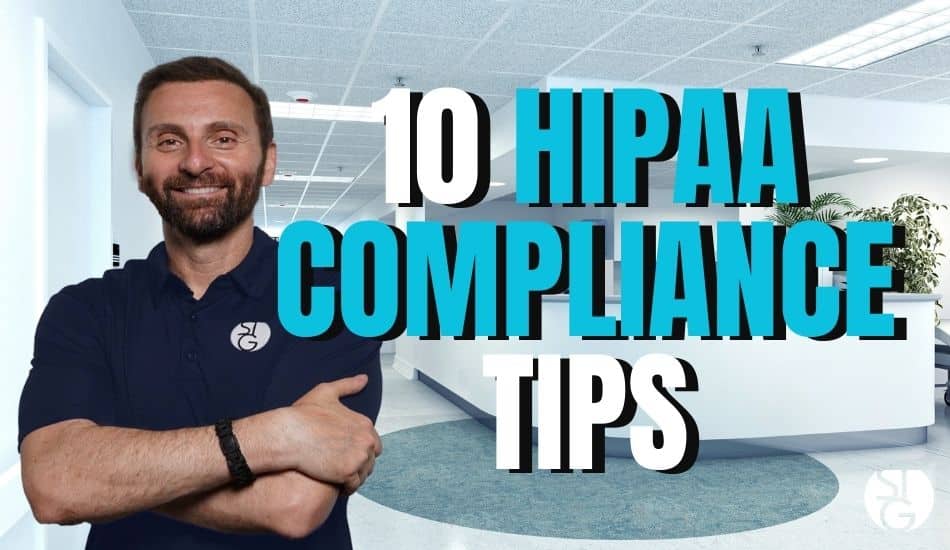Do you need to make your business’s IT HIPAA compliant but don’t know where to start? We’ve got you covered. Here are 10 HIPAA Compliance tips for small medical practices to follow.
LA-based healthcare organizations face a concerning amount of cybersecurity threats. From phishing scams to ransomware attacks, the stakes have never been higher when it comes to protecting patient privacy and maintaining HIPAA compliance.
Keeping these things safe starts with your IT infrastructure.
10 HIPAA Compliance Tips
Tip 1: Conduct a Baseline Risk Assessment
Businesses who aspire to be HIPAA compliant know it takes more than checking boxes on a chart. It requires dedication to secure sensitive patient information against cyber threats.
One of the first steps in this journey is to conduct a baseline risk assessment.
This assessment allows healthcare practices to highlight their own vulnerabilities and weak points in their IT systems.
Only when you understand your security posture can you lay the foundation for a robust cybersecurity strategy.
Tip 2: Educate Your Staff
HIPAA compliance truly starts from within your business.
And let’s face it, if you run a healthcare organization, your employees are both your greatest asset and your biggest vulnerability when it comes to cybersecurity.
Human error is still the leading cause of data breaches in the healthcare industry.
You need to be educating your staff on cyber dangers in order to remain HIPAA compliant.
When you impart employees with the knowledge and skills needed to detect and respond to cybersecurity threats, you put your healthcare organization in a significantly better overall security posture.
Tip 3: Encrypt Electronic Communications
Since the pandemic, there has been a massive uptick in online communication between patients and their healthcare providers – which raises some security concerns if not properly maintained.
In order to stay HIPAA compliant, businesses need to encrypt their electronic communications.
Encryption is a powerful tool that provides an added layer of protection for patient data and confidentiality.
By embracing encryption protocols, your healthcare organization is able to uphold HIPAA standards and secure sensitive information from any prying eyes.
Tip 4: Require Unique User Identification
When trying to stay HIPAA compliant, healthcare practices with multiple staff members and IT devices must understand the importance of assigning unique user identification.
By assigning each team member a distinct identifier, it enhances the overall accountability within your practice’s digital ecosystem.
You should be tracking who is accessing patient data and what they do with it. This includes assigning levels of access depending on authority which will ensure the right individuals are seeing certain data.
Doing so not only strengthens internal security, but it also mitigates the risk of unauthorized access.
Tip 5: Create Staff Reporting Procedures
You can help your staff maintain HIPAA compliance by creating reporting procedures when things go wrong.
Cybersecurity readiness a more important than ever before and your staff should know what to do in case of emergency.
Early detection is key to minimizing cybersecurity risks, and when you train your staff on reporting procedures, you empower them to be proactive in identifying and addressing potential security incidents.
The goal is to foster a culture of transparency and accountability to improve cybersecurity and protect patient data.
Tip 6: Be Mindful of Social Media Activity
Who knew HIPAA compliance would include monitoring social media activity?
Listen, it can be tough to navigate the intersection of social media and patient privacy.
But so it’s clear, publicly engaging with patients on social media can inadvertently violate HIPAA regulations.
To ensure patient confidentiality, your healthcare business should be mindful of its social media activity and refrain from connecting with and sharing patient information publicly.
Don’t put yourself at risk and use good judgment when interacting online.
Tip 7: Integrate Activity Audit Controls
In order to maintain HIPAA compliance, we suggest organizations record and examine user activity across their network.
They should have a record of everyone trying to access patient data.
Activity audit controls enable businesses to monitor access to electronically protected health information or EPHI and detect any suspicious behavior.
Using software that records and examines user activity is a way to make a user accountable to any malicious activity and helps a business with their cybersecurity defenses.
Tip 8: Properly Secure and Store Patient Photos
HIPAA regulations will get ya if you don’t know how to properly secure and store patient photos.
Any photos used to document patient procedures are considered protected health information or PHI and require careful handling and storage.
Healthcare businesses should make sure they are storing patient photos in secure, HIPAA-compliant servers or systems and obtain patient consent before using or sharing them.
Tip 9: Use Automatic Logoff Procedures
This HIPAA compliance tip focuses on using an automatic logoff procedure.
Simply apply this in device settings and set a timer.
An automatic logoff is a simple yet effective way to boost your cybersecurity defenses. They prevent unauthorized access to EPHI by logging off when workstations are left unattended.
These procedures can help your business minimize the risk of unauthorized access from snooping eyes or accidental account use.
Tip 10: Implement a Strong Password Policy
Now let’s talk about the cornerstone of cybersecurity and one of the best ways to stay HIPAA compliant – strong passwords.
Implementing a strong password policy is essential for protecting patient data from unauthorized access.
Healthcare organizations in particular should encourage the use of long, complex passwords, and better yet – use a password manager and implement multi-factor authentication whenever possible.
A robust password policy is a great way for your business to defend against cyberattack attempts.
Extra HIPPA Compliance Tips for Your Los Angeles-Based Medical Business
Secure Remote Access
Implement multi-factor authentication (MFA) for staff accessing protected health information (PHI) remotely. MFA requires a second verification step, like a code sent to a phone, ensuring that even if a hacker steals login credentials, they can’t access sensitive patient data. Regularly update MFA settings and train staff to use them correctly to maintain robust security for telehealth or work-from-home setups.
Read more: Drastically Improve Online Safety with Security Keys
Monitor Device Usage
Track every device that handles PHI by maintaining detailed inventory logs. Record device types, serial numbers, and assigned users, and routinely inspect your network for unauthorized devices. This prevents rogue laptops or tablets from connecting and leaking patient data, especially in small practices where personal devices might slip into use unnoticed.
Restrict USB Drive Usage
Ban unencrypted USB drives for storing or transferring PHI to avoid data breaches from lost or stolen devices. Enforce policies that block external devices from connecting to practice computers unless they’re encrypted and approved. Provide staff with secure, HIPAA-compliant alternatives, like encrypted drives or cloud-based file-sharing tools, to safely handle patient information.
Conduct Exit Audits for Staff
Revoke access to PHI immediately when an employee leaves your practice. Deactivate their accounts, change shared passwords, and audit their activity to ensure no patient data was copied or shared. This step protects against disgruntled ex-staff misusing PHI and demonstrates your commitment to safeguarding patient privacy post-employment.
Implement Session Timeouts
Configure systems to log out automatically after a few minutes of inactivity, especially on computers handling PHI. This prevents unauthorized access if a staff member steps away from their desk in a busy office. Set timeouts to balance security and workflow, ensuring patient data stays protected without disrupting daily tasks.
Use HIPAA-Compliant Cloud Storage
Store PHI only on cloud platforms with HIPAA-compliant features, like end-to-end encryption, access controls, and detailed audit logs. Verify that vendors sign business associate agreements (BAAs) and regularly review their security practices. This ensures patient data remains secure, even when accessed or stored off-site, reducing risks in small practices with limited IT resources.
Create Incident Reporting Channels
Establish a straightforward process for staff to report potential HIPAA violations, such as lost devices or suspicious emails. Provide anonymous reporting options and train employees to act quickly without fear of retaliation. Swift reporting allows you to investigate and mitigate issues before they escalate into full-blown breaches, protecting both patients and your practice.
Secure Fax Transmissions
Use encrypted electronic fax services to send PHI, avoiding traditional fax machines that lack security. Always double-check recipient numbers to prevent misdirected faxes, which could expose patient data to unauthorized parties. Train staff on proper fax protocols and maintain logs of all transmissions to ensure accountability and compliance.
Limit PHI in Public Areas
Prohibit discussing PHI in waiting rooms, hallways, or other public areas where patients or visitors might overhear. Train staff to hold sensitive conversations in private spaces and use privacy screens on computers to block prying eyes. These habits reduce the risk of accidental disclosures, fostering trust and ensuring compliance in high-traffic office settings.
Regularly Review Audit Logs
Check system audit logs weekly for unusual activity, such as logins during off-hours, repeated failed access attempts, or large data downloads. Use monitoring tools to flag anomalies and investigate promptly to catch potential breaches early. Regular reviews help small practices stay proactive, ensuring PHI remains secure against internal and external threats.
Check out our last video! ➡️ Understanding the Average Cost of IT Support
If you have a Los Angeles business and are looking for an IT provider to help you maintain HIPAA compliance, feel free to reach out to us at stginfotech.com or schedule a call via the calendar link below to learn more about how we can help you budget your IT infrastructure.
STG Infotech proudly provides IT Services for Small to Medium Businesses in Greater Los Angeles. We’d love to see if we can help you too!

Let’s dive into your IT!
Schedule a free 15-minute Virtual Meeting with a Business Technology Specialist of STG Infotech and get a closer look into your IT challenges.
We will assess your current IT infrastructure and answer any questions you may have about IT Services or partnering with STG IT.




